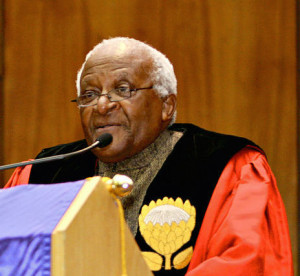[Washington Window] Archbishop Desmond Tutu spoke of his sometimes quarrelsome relationship with God and his enduring faith in humanity’s goodness at a March 19 talk at the National Press Club, where he was promoting his new book, “God has a dream; a vision of hope in our time.” (Doubleday, 2004)
Tutu, who is the recipient of the 1984 Nobel Peace Prize for his work to end apartheid, retired as the Anglican Archbishop of Cape Town in 1996, and was appointed by Nelson Mandela to chair South Africa’s Truth and Reconciliation Committee.
During this time, Tutu said, he had the opportunity to peruse the minutes of the country’s former State Security Council – records the writers “had never in their worst possible nightmares imagined would see the light of day.”
That, he said, was proof that in the end, truth and justice will prevail.
“They didn’t ever imagine that they would come to grief, as has been the case with almost all dictators before them and since,” he said, counting off a long succession of fallen despots on his fingers. “They always get their comeuppance in the end. Might will never be right, even when it seems so.”
But sometimes – often – it doesn’t seem that way, he said, explaining that this is where faith comes in.
“One of the things I am seeking to underscore – to remind you – is that this is a moral universe,” he said. “That right and wrong in fact matter… that lies, despite any indication to the contrary, will not, in fact, have the last word… This is God’s world, and God is in charge.”
Acknowledging that God is in charge means accepting that we are not, Tutu said, and accepting that we are not in control means accepting that God does things God’s way, not the way we think they should be done.
Given the power, we might choose to snuff out the lives of dictators “like a candle,” he said, but God is not like that: because God in his benevolence has given us the gift of freedom.
“God would much rather I went freely to hell than compel me to go to heaven,” Tutu said: That God allows evil to exist is an “incredible testimony to the kind of God we have.”
People are free to choose to do evil, but Tutu believes that “God created us good. We are created for goodness.”
And good or bad, we are all part of God’s family, Tutu said, whether or not we would choose some of our family members.
“Many times people have asked, ‘Have you ever wavered in your faith?’” Tutu said. “And I’ve said, ‘Never.’ But what I’ve done is weeping or remonstrating with God. I get very angry with God and I really give him a piece of my mind. I think God expects that we should be as God has created us and say, ‘For goodness’ sake, what are you doing?’”
Tutu’s anger is often prompted when he sees injustice, he said, pointing out that there are some disturbing things going on in this country and elsewhere in the world right now.
Guantanamo Bay, the U.S. Naval base in Cuba where approximately 660 prisoners from the war in Afghanistan are being held on suspicion of having links to Al Qaida or the Taliban without access to lawyers – has particularly shocked him, he said, as it reminds him of apartheid.
“In South Africa, what did they used to say about detaining people without trial?” he said. “National security. They gradually hone your civil liberties and you are compliant. That is what has shocked me about coming here.”
But while he doesn’t understand God’s plan, Tutu said he is unwavering in his belief that “this universe is ultimately the site of the triumph of God.”

